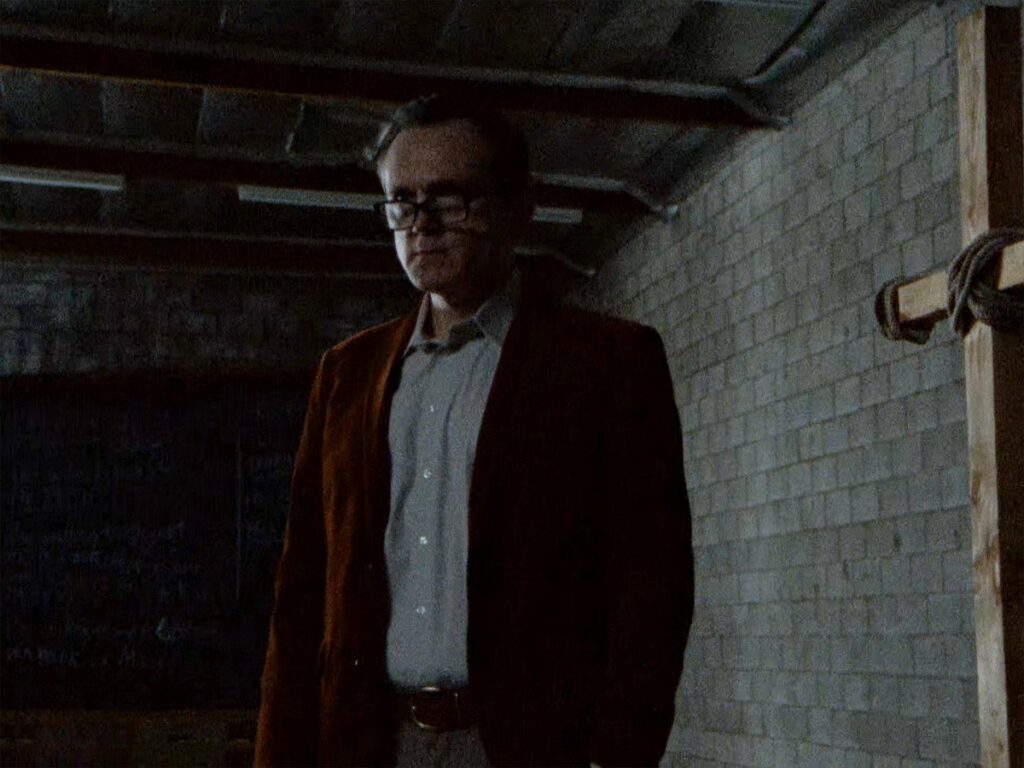It should be said right off the bat that if you plan on watching “You’ve Never Been Completely Honest,” you should prepare for something deeply unsettling and grotesque. Joey Izzo’s film uses a recorded interview from 1970 to recount events that took place over four days in what is essentially a torture chamber disguised as a self-help seminar meant to get to the heart of everyone’s “truth.” That part is left purposefully vague, but what happens to a group of men in this dire situation is presented rather explicitly through the recorded interview, reenactment and animation (the cast must have been relieved for the animated segments).
The man giving his testimony is named Gene Church (played in the reenactments by Phil Burgers), who was told that if he wanted to move up into management he and a few other gentlemen had to complete a four-day self-improvement seminar, completely unaware of what it entailed. The seminar did not take place in a conference room of the hotel, but rather in a dark basement where the men saw a coffin, animal cages, and a cross to hang on. One man spends the night in the coffin while the other men take turns watching over him. Many of them are forced to be nude and to commit unspeakable acts of violence and degradation to one another.
What is the point, you ask? That’s what Izzo saves for last, but suffice to say, such self-improvement seminars like this still exist today and that this may have been the start of it all. The interview we are hearing is not meant for public ears and Gene is very matter-of-fact about his involvement as well as his own torturous experience. The kinds of fraudulent people who profit from sadistic means of self-awakening would rather you not see their practices ahead of time before they get your money. What happens to Gene at the end might have been a breakthrough (we never know), but at what cost? How much of this will end up haunting him in the long run? My guess: All of it.
Izzo’s film leaves a lot for the viewer to decide, but the film is a hypnotic retelling of this insanity. Obviously, the interview in and of itself is compelling enough, but Izzo smartly mixes between grainy, 16mm reenactment and animation that does just enough to convey some of the more disgusting acts that took place. The film never lingers too long on one visual element or the other. It’s a consistent mix and with just the right rhythm so that the transitions look seamless. Burgers, a brave actor for doing this, gives the film’s central, wordless performance and carries it well. Pat Healy, who plays the “lead instructor,” looks like he would be perfect for the role if they ever did a feature-length dramatization; he is creepy, charismatic and piercing.
“You Have Never Been Completely Honest” is a strong piece of work that really gets under your skin. It’s the only time at the Chicago Critics Film Festival when I had to give the audience a trigger warning beforehand. Consider yourself warned.

Q&A with director Joey Izzo
How did you find this interview? What more can you tell me about it?
I found the interview from a past-participant of Leadership Dynamics that I met on an unrelated forum that is now defunct. Basically, I posed as a sympathetic and curious student of the founder William Penn Patrick and was able to get a hold of it that way. Later on, when I made contact with Gene Church, he told me more about the exact circumstances of the interview and I felt like it was safe to proceed with his blessing.
How did you go about shaping this interview into a 10-minute film? What interested you the most about it?
The whole interview was about 40 minutes, but it was pretty clear to me what was going to work for my use of it. I was most interested in Gene’s interpretation of the events on the day of his ordeal. I focused mainly on those portions of the interview and tried to re-edit it for narrative flow and shape. I really wanted to stick to the facts of what happened to him and make it feel subjective to his experience. I also tried to sporadically use the interview questions whenever I felt like he would be addressing concerns that the viewing audience might be asking themselves. Then, I went back in and tried to set the whole thing up with just enough expositional information as needed to clue the audience in on the specifics without getting too lost in the weeds.
What did you use to film the reenactments to help give it that aged look?
It was a combination of things. We shot on 16mm and chose a very fast stock, then we “push-processed” it a couple of stops, which is when you purposefully underexpose it and then increase exposure in the development process. This combination created the “unearthed from a damp basement” look we were going for. I also did a lot of scaling in the edit, which brought out a lot more artifacts.
Directing the reenactments must have been difficult. What was the atmosphere like on the set?
Honestly it was a breeze! I tried to anticipate any unknown issues in performance during the casting process. I know I wanted Phil Burgers and Pat Healy in this. I’m a fan of both of them. Phil I knew, but Pat I was introduced to through a mutual friend. I had long conversations with both of them and worked it all out in terms of process and intentions. The rest of the cast was made up of actors I had worked with before and a troupe of clowns that performed together alongside Phil for years. So I knew there would be a built in comfort and trust among them. They are all fearless performers and nothing I instructed them to do was ever a problem. Plus, everyone had copies of the storyboards and a “demo video” that I made long before we shot. So they knew exactly what was going to be asked of them, down to the exact frame and timing of the shot.

How did the animation aspect of the film get woven in?
I made a demo video (basically an “animatic”) for the entire short out of illustrated storyboards. I went through the video and picked out shots that would be entirely reenactment, shots that would be entirely animated, and shots that would have elements of both. Dusty and Taylor from Mortis Studio came on board months before the reenactment shoot, so I was able to base the look of the animated characters on the people I casted, along with the location, props, etc. I was also able to provide them with background plates that we grabbed during the reenactment shoot. Taylor, Dusty and I were very interested in an interwoven and layered look for the animation, akin to Ralph Bakshi, so it was really important for us to feed off of each other throughout the production.
Have you ever talked with anyone who had been through a seminar like this (maybe not as torturous, but just intense)?
Oh yes, I’ve talked to many people that have taken various seminars around this time and even a few that took Leadership Dynamics training. There is no ambiguity regarding the L.D.I. training, every graduate I’ve spoken with corroborates Gene’s account of the events, even past trainers. I’ve also found court testimony from the founder of L.D.I. William Penn Patrick in which he downright brags about it. It’s important to recognize L.D.I. as a forerunner for subsequent groups, but that’s not to say that all seminar experiences are like this (though some are! even today). I hope that such an obvious example of abuse can shine a light on the shaky foundations of a lot of seminars that purport to help people, while concealing hidden dangers.
What’s next for you?
I’m developing a TV series on the untold history of the self-help industry. At the end of the short, I tried to at least hint at the developing industry to come, but now I have the opportunity to tell the whole story. You can think of the short as a type of dark shadowy origin for a multi-billion dollar industry that affects us all.












